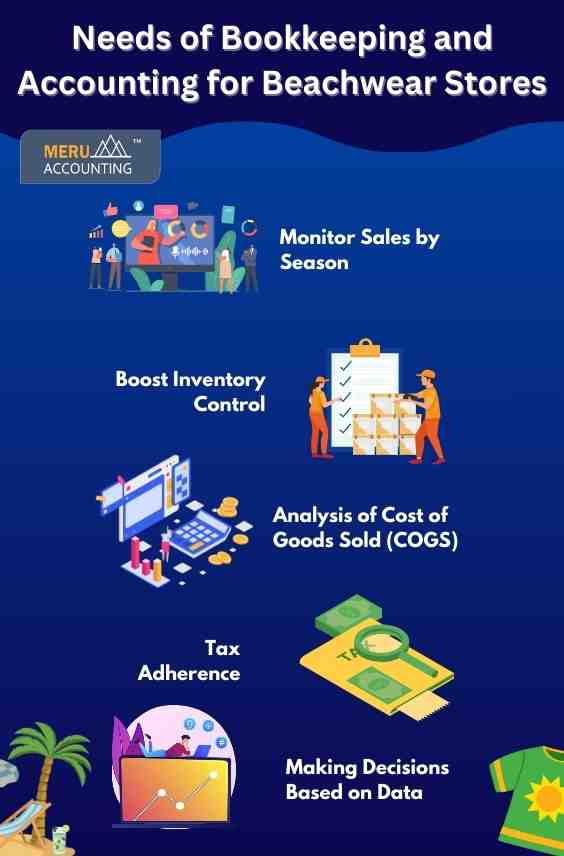
Bookkeeping and Accounting for Beachwear Stores
Beachwear stores serve a specific consumer base by providing a range of clothes and accessories designed for beachgoers and tourists. Among the needed clothing for beach excursions and tropical vacations, these shops usually have swimsuits, cover-ups, beach towels, sandals, and sun hats. Effective bookkeeping and accounting are important for properly managing finances in these firms, given the seasonal nature of beachwear fashion and the variable demand driven by weather and travel trends.
Precise monitoring of stock, revenue, and outlays is essential for maximizing stock levels, recognizing best-selling products, and estimating demand. With its experience in retail accounting and comprehension of the particular difficulties this business faces, Accounts Junction specializes in giving customized bookkeeping and accounting solutions for beachwear stores. Accounts Junction provides beachwear store owners with individualized support, innovative accounting software, and insights into the business performance so you can make well-informed decisions that will propel development and profitability in this industry.
Dashboards we prepare for bookkeeping for Beachwear Stores Industry
Core Aspects of Accounting and Bookkeeping for Beachwear Stores
1. Monitoring Earnings:
- Track Sales & Revenue: To understand their revenue sources, pay careful attention to all sales channels, including online and in-store. Determine the best-selling products by analyzing sales trends, then modify their inventory or marketing plans appropriately.
- Cost of Goods Sold (COGS): Keep track of the out-of-pocket expenses related to their beachwear, including the swimsuit itself, shipping, packing, and customs. Understanding COGS enables them to establish competitive prices and profit margins.
- Profitability Analysis: To assess their profitability, use financial statements such as income statements. Determine where they can cut costs and increase their profit margin.
2. Management of Inventory:
- Inventory control: Keep thorough records of the amount, price, and style of the beachwear they own. To reduce shrinkage and make sure that they have the correct mix of products to fulfill client demand, regularly inspect their inventory.
- Planning for the Seasons: Consider seasonal patterns while arranging the acquisition of merchandise. Before the busiest time of year, stock up on popular styles to beat stockouts and take advantage of sales opportunities.
- Valuing Inventory: To guarantee that the value of their inventory is accurately shown on the balance sheet, use an appropriate inventory valuation method, taking into account any possible style modifications.
3. Analysis and Reporting of Financial Data:
- Produce Statements of Financial Position: Create important financial statements, such as cash flow, balance sheet, and income statement. These reports give them a complete picture of their cash flow, profitability, and overall financial health.
- Analysis of Financial Ratios: Compute financial ratios (profit margin, inventory turnover, etc.) to learn more about the operation of the company. Examine these ratios' patterns to find areas that could use improvement.
- Making Decisions Based on Data: Utilise their financial information to guide business decisions. Determine how to best staff based on sales volume, assess marketing success using ROI, and modify purchasing decisions by analyzing sales patterns.
4. Taxes and Payroll:
- Sales Tax Collection: Making sure that they follow local laws while collecting and sending in sales tax on their purchases. Keep thorough sales records to make filing taxes easier and stay out of trouble.
- Payroll Administration: Maintain precise records of employee hours worked, pay, and social security and tax withholdings. Payroll software can help to ensure that labor regulations are followed while streamlining this procedure.
- Tax Organization: Seek advice from a tax expert to comprehend their tax responsibilities and investigate methods to reduce their tax liability.
Benefits of Bookkeeping and Accounting for Beachwear Stores
Making Well-Informed Decisions:
- Determine the best-selling products by analyzing sales data. This will help them buy inventory and develop marketing plans that will maximize their profits.
Monitoring Profitability:
- Keep an eye on their earnings and outlays to determine their profit margins. With this information, they can find opportunities for cost savings and modify their pricing tactics.
Optimising Inventory:
- To prevent stock-outs during peak season and out-of-style excess goods, maintain precise stock levels.
Tracking Financial Well-Being:
- Frequent financial statements give them a clear picture of the financial situation of their beachwear business, enabling them to spot problem areas and take proactive steps to ensure long-term success.
Needs of Bookkeeping and Accounting for Beachwear Stores
- Monitor Sales by Season: Gather sales information from all platforms (online and in-store) to comprehend annual income variations. This makes it possible to plan inventories and budgets wisely for peak seasons.
- Boost Inventory Control: Ensure that the right number of different designs and sizes are in stock. Maintain a close eye on inventory movement to reduce shrinkage and make sure that they have the correct mix of products to fulfill demand from customers both during peak and off-peak times.
- Analysis of Cost of Goods Sold (COGS): Keep track of every expense related to beachwear, such as the item itself, shipping, import duties, and packaging. For precise profit margin calculations and competitive pricing, an understanding of COGS is essential.
- Tax Adherence: Making sure that sales tax is correctly collected and remitted on every transaction. Keep accurate sales records to make filing taxes easier and stay out of trouble.
- Making Decisions Based on Data: Examine financial information to find patterns in sales, best-selling products, and areas where expenses can be reduced. Make educated judgments about upcoming purchases, marketing tactics, and workforce sizes by utilizing these insights.

Why Choose Accounts Junction?
Accounts Junction is the ideal choice for bookkeeping and accounting services tailored specifically for beachwear stores. With a proven track record of expertise in retail accounting, Accounts Junction offers specialized solutions to streamline financial operations, ensuring accurate record-keeping and compliance with industry standards. Our team of experienced professionals understands the unique challenges faced by beachwear retailers, such as seasonal fluctuations and inventory management complexities.
By utilizing advanced accounting software and customized reporting tools, Accounts Junction provides real-time insights into financial performance, empowering store owners to make informed decisions and optimize profitability. Additionally, our commitment to personalized service means that beachwear store owners can rely on dedicated support and proactive guidance to navigate financial hurdles effectively. With Accounts Junction, beachwear retailers can confidently delegate bookkeeping and accounting tasks, allowing them to focus on growing their business and serving their customers with exceptional beachwear products and services.
Services offered by Accounts Junctions for Beachwear Stores
1. Accounting & Bookkeeping Streamlined:
- Recording Transactions Without Much Work: Put in place user-friendly methods to effectively monitor revenue, costs, and inventory. Point-of-sale systems, accounting software, and automated bookkeeping activities can all be a part of this.
- Precise Accounting Records: Keep thorough records of every financial transaction, organized so that they can be easily analyzed. This covers information on sales, procurement of goods, payroll for employees, and operating expenses.
- Bank Statements Adjusted: Making sure that all recorded transactions match their bank's records by routinely reconciling their bank statements. This reduces errors and aids in finding disparities.
2. Control and Management of Inventory:
- Tracking Inventory in Real Time: To keep an eye on stock levels in real-time, use an effective inventory management system. As a result, stockouts during busy seasons are avoided and well-informed restocking decisions are empowered.
- Reduced Shrinking: Employ security measures and routine inventory inspections to reduce shrinkage, or lost or stolen goods.
- Optimal Mix of Inventory: To better understand consumer preferences and manage their inventory mix, analyze sales data. This guarantees that they avoid having too much inventory and have the appropriate styles and sizes in store to satisfy client demand.
3. Payroll and Tax Administration:
- Precise Payroll Management: Making sure that employee payroll is processed accurately and on schedule, including wages, social security and tax withholdings, and deductions.
- Easy Tax Return Filing: Simplify the administration of taxes by keeping correct records and abiding by all tax laws pertaining to income taxes, payroll taxes, and sales taxes. Take into consideration seeking advice from a tax expert.
- Diminished Fines & Penalties: The possibility of regulatory organizations imposing penalties and fines is reduced by handling payroll and taxes correctly.
4. Analysis and Reporting of Financial Data:
- Financial Statements That Are Educational: Create important financial statements, such as cash flow, balance sheet, and income statement. These reports give them a complete picture of the profitability, cash flow, and overall state of their company's finances.
- Data-Based Perspectives: Gain insightful knowledge about sales trends, consumer behavior, and areas for development by analyzing financial data. Determine which of their products are their best sellers, adjust their price tactics, and plan ahead for future purchases and advertising campaigns.
- Monitoring Financial Performance: Track progress and uncover areas that need improvements by routinely evaluating their financial performance using critical measures such as profit margins, inventory turnover, and return on investment (ROI).
Conclusion
Accounts Junction provides all-inclusive support to make sure that your company survives and grows. Our simplified accounting and bookkeeping services meet the particular requirements of beachwear retailers. We provide up-to-date sales trends and financial planning information so they can easily handle seasonal swings. With data analysis catered to their particular requirements and comprehensive financial reports made specifically for the beachwear market, they may gain important insights into the performance of their firm.
Utilise data-driven suggestions that take seasonal trends and consumer behavior into account when making well-informed decisions regarding pricing, marketing, and purchasing. They should concentrate on building a successful beachwear company, and we'll take care of the financial details, regulatory compliance, and peace of mind. Join together with Accounts Junction right now to see year-round success for their beachwear business.
| # | Account Number | Account Name | Account Type |
|---|---|---|---|
| 1 | 1000 | Bank & Cash Accounts | Bank |
| 2 | 1000 | Bank & Cash Accounts:Checking account | Bank |
| 3 | 1000 | Bank & Cash Accounts:Petty Cash | Bank |
| 4 | 1000 | Bank & Cash Accounts:Savings Account | Bank |
| 5 | 1010 | Inventory (e.g., swimsuits, beach accessories) | Current Asset |
Beachwear Stores Industry Faqs
Frequently Asked Insights
1. How do you manage inventory for seasonal beachwear items?
We help monitor inventory levels, manage seasonal stock, and ensure that sales and returns are accurately reflected in your financial records.
2. Can you assist with sales tax compliance for beachwear products?
Yes, we ensure that sales tax is correctly calculated and filed, including handling any state-specific exemptions or regulations that apply to beachwear items.
3. How do you handle accounting for online and in-store sales?
We reconcile sales from both your physical store and online platform, ensuring that all transactions are accurately reflected in your financial statements.
4. Can you help manage payments to beachwear suppliers?
Yes, we track vendor invoices, payment terms, and supplier agreements to ensure timely payments and avoid any discrepancies.
5. How do you handle returns and refunds for beachwear items?
We ensure accurate tracking of returns and refunds, ensuring that they align with your sales figures for consistency in your financial records.
6. Can you assist with budgeting for busy seasons like summer?
Yes, we provide financial planning to help manage cash flow effectively during peak sales periods, ensuring you are well-prepared for high-demand seasons.
7. Do you assist with payroll for seasonal staff during peak beachwear sales periods?
Yes, we handle payroll for both full-time and seasonal employees, ensuring that wages are calculated correctly and on time.
8. Which financial software do you recommend for managing beachwear store finances?
We recommend tools like QuickBooks or Xero, which streamline your accounting, sales tracking, and inventory management processes.
Hospitality industry has to provide better services to their customers to ensure their business has sustainability. The better they provide service, they have better chances of growing their business. There are broad categor...
Read MoreLast two decades have seen a considerable change in the trucking industry that has changed the working pattern of trucking companies. This has also changed the needs of the finance and accounting pattern of trucking companie...
Read MoreIndependent contractors will always try to find new projects with bigger ticket sizes to grow their business. Although most of the contractors may have a systematic way of workflow in their work areas, however, very few have...
Read MoreEvery small business owner understands the importance of bookkeeping in ensuring accurate accounting. This necessity for effective bookkeeping is especially critical in petrol stations, where a significant number of transact...
Read MoreA manufacturing company must use a predetermined quantity of raw materials, work-in-process, and finished goods in the course of its operations, and any ending balances must be fairly valued to be recorded on the balance she...
Read MoreOne of the primary functions of accounting is to monitor the business process. This is essential for all industries, including distribution and trading companies. Accounting, also known as internal control, is a tool used to...
Read MoreAccounts Junction provides the best insurance accounting experts for insurance agency accounting and bookkeeping. Our team has years of experience working with insurance agencies. We understand the unique requirements and pr...
Read MoreWhen you are running an event management company, you need to have a very organized approach. It is also important that you are managing your finances properly with proper management of bookkeeping and accounting. Many Event...
Read More
Accounts Junction's bookkeeping and accounting services
